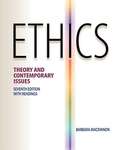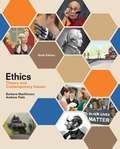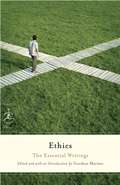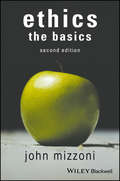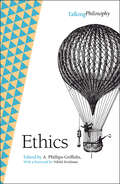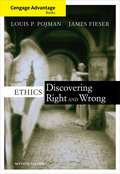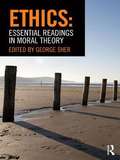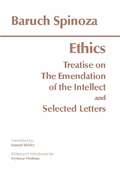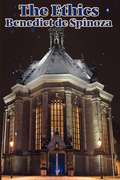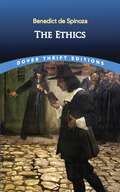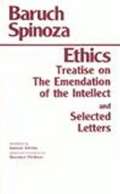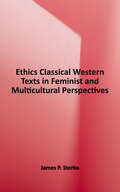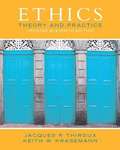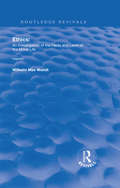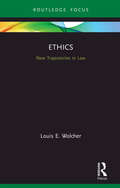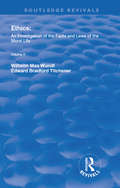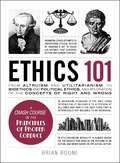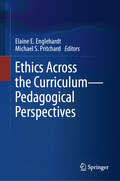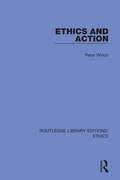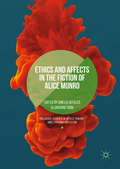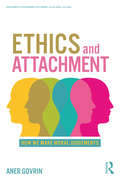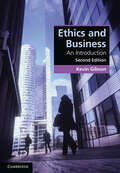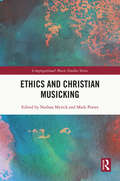- Table View
- List View
Ethics: Theory and Contemporary Issues (7th Edition)
by Barbara MackinnonClosely examine the major areas of ethical theory as well as a broad range of contemporary moral debates using MacKinnon's acclaimed Ethics: Theory and Contemporary Issues, Seventh Edition. Illuminating overviews and a selection of readings from both traditional and contemporary sources make even complex philosophical concepts reader friendly. Comprehensive, clear-sighted introductions to general and specific areas of ethical debate cover major ethical theories, including feminist ethics, contract theory, and ethical relativism, before delving into issues ranging from euthanasia and sexual morality to war and globalization. A broader range of voices and philosophical traditions in this edition includes continental and non-Western philosophers, with new readings from prominent ethicists. Increased coverage of contemporary dilemmas highlights issues of widespread interest, including torture and terrorism, "partial birth" abortion, cloning, same-sex marriage, and global distributive justice. An innovative online resource center offers, among other things, animated simulations. These simulations allows you to personally engage with dilemmas and thought experiments commonly presented in introduction to ethics classes and provide instructors with a way to seamlessly integrate online assignments into the class.
Ethics: Theory and Contemporary Issues
by Barbara MacKinnon Andrew FialaExplore the major perspectives in ethical theory and contemporary moral debates using ETHICS: THEORY AND CONTEMPORARY ISSUES, 9th Edition. Overviews and a selection of readings from traditional and contemporary sources make complex philosophical concepts reader-friendly. Comprehensive introductions to general and specific areas of ethical debate cover such influential ethical theories as religion and global ethics, utilitarianism and deontology, natural law ethics, and feminist and care ethics. Contemporary moral issues include euthanasia, sexual morality, economic justice, war, violence, globalization, structural racism, and same-sex marriage. MindTap offers assessments along with animated ethics simulations that allow you to engage with the philosophical issues and concepts discussed in the text.
Ethics: The Essential Writings (Modern Library Classics)
by Gordon MarinoIn Ethics: The Essential Writings, philosopher Gordon Marino skillfully presents an accessible, provocative anthology of both ancient and modern classics on matters moral. The philosophers represent 2,500 years of thought--from Plato, Kant, and Nietzsche to Alasdair MacIntyre, Susan Wolf, and Peter Singer--and cover a broad range of topics, from the timeless questions of justice, morality, and faith to the hot-button concerns of today, such as animal rights, our duties to the environment, and gender issues. Featuring an illuminating preamble, concise introductory essays on the giants of ethical theory, and incisive chapter headnotes to the modern offerings, this Modern Library edition is a perfect single-volume reference for students, teachers, and anyone eager to engage in reflection on ethical questions, including "What is the basis for our ethical views and judgments?" Gordon Marino is professor of philosophy and director of the Hong Kierkegaard Library at St. Olaf College in Northfield, Minnesota. A recipient of the Richard J. Davis Ethics Award for excellence in writing on ethics and the law, he is the author of Kierkegaard in the Present Age, co-editor of The Cambridge Companion to Kierkegaard, and editor of the Modern Library's Basic Writings of Existentialism. His essays have appeared in The New York Times.From the Trade Paperback edition.
Ethics: The Basics, 2nd Edition
by John MizzoniUpdated and revised, Ethics: The Basics, Second Edition, introduces students to fundamental ethical concepts, principles, theories, and traditions while providing them with the conceptual tools necessary to think critically about ethical issues. Introduces students to core philosophical problems in ethics in a uniquely reader-friendly manner Lays out clearly and simply a rich collection of ethical concepts, principles, theories, and traditions that are prevalent in today’s society Considers western and non-western viewpoints and religious interpretations of ethical principles Offers a framework for students to think about and navigate through an array of philosophical questions about ethics
Ethics
by A. Phillips-Griffiths Nikhil KrishnanEthical questions are often associated with practical dilemmas: questions in morality, in other words. This volume, by contrast, asks questions about morality: what it is, and to what it owes its precarious authority over us. The focus on metaethics is sustained throughout, via a wide range of philosophical perspectives. Distinguished luminaries who include R. M. Hare and Bernard Williams address keenly debated issues such as what constitutes morality in politics; the relationship between education and ethical standards; and whether or not morality can indeed be defined at all. As Nikhil Krishnan writes in his elegant Foreword, 'The plain-speaking, essayistic grace of these essays, speaks nevertheless of the possibility of moral philosophy, written with an eye to a listener, very possibly not a professional philosopher, who has the right to say, ''This is all very well, your neat little theory, but it doesn't ring true. Things are more complicated than that.'''
Ethics: Discovering Right And Wrong
by Louis P. Pojman James FieserStudy ethics from a classic ethics text, written by one of contemporary philosophy's most skilled teachers, Louis P. Pojman, now revised by best-selling author and editor of the INTERNET ENCYCLOPEDIA OF PHILOSOPHY, James Fieser. ETHICS: DISCOVERING RIGHT AND WRONG, Seventh Edition, offers a concise yet comprehensive overview of the fundamental objectives and outlooks of ethical theory. Written with Pojman's hallmark engaging, conversational manner with strong supporting pedagogy, this book challenges students to develop their own moral theories and to reason through ethical problems for themselves. The text even-handedly raises critical questions and fosters independent thinking within a rigorous presentation that draws numerous examples from both classical and contemporary sources. This edition maintains the text's clarity and strengths with its non-dogmatic style and generous presentation of various positions. This revision includes more feminist and multicultural ethical perspectives.
Ethics: Essential Readings in Moral Theory
by George SherEthics: Essential Readings in Moral Theory is an outstanding anthology of the most important topics, theories and debates in ethics, compiled by one of the leading experts in the field. It includes sixty-six extracts covering the central domains of ethics: why be moral? the meaning of moral language morality and objectivity consequentialism deontology virtue and character value and well-being moral psychology applications: including abortion, famine relief and consent. Included are both classical extracts from Plato, Aristotle, Hume, Kant and Mill, as well as contemporary classics from philosophers such as Thomas Nagel, Thomas Scanlon, Martha Nussbaum, Derek Parfit, and Peter Singer. A key feature of the anthology is that it covers the perennial topics in ethics as well as very recent ones, such as moral psychology, responsibility and experimental philosophy. Each section is introduced and placed in context by the editor, making this an ideal anthology for anyone studying ethics or ethical theory.
Ethics: with The Treatise on the Emendation of the Intellect and Selected Letters
by Baruch Spinoza Seymour Feldman Samuel ShirleySince their publication in 1982, Samuel Shirley's translations of Spinoza's Ethics and Selected Letters have been commended for their accuracy and readability. Now with the addition of his new translation of Treatise on the Emendation of the Intellect this enlarged edition will be even more useful to students of Spinoza's thought.
The Ethics
by Benedict De SpinozaBenedict de Spinoza's writings laid the groundwork for the 18th century Enlightenment and for modern Biblical criticism. By virtue of his magnum opus, The Ethics, Spinoza is considered one of Western philosophy's definitive ethicists.
The Ethics: (ethica Ordine Geometrico Demonstrata) (Dover Thrift Editions)
by Benedict De SpinozaEthics is a philosophical book written by Benedictus de Spinoza. Although published after Spinoza's death, in 1677, it is considered his greatest and most famous work. In it, Spinoza tries to set out a "fully cohesive philosophical system that strives to provide a coherent picture of reality and to comprehend the meaning of an ethical life. Following a logical step-by-step format, it defines in turn the nature of God, the mind, human bondage to the emotions, and the power of understanding
Ethics: With the Treatise on the Emendation of the Intellect, and Selected Letters
by Benedictus De SpinozaSince their publications in 1982, Samuel Shirley's translations of Spinoza's Ethics and Selected Letters have been commended for their accuracy and readability. Now with the addition of his new translation of Treatise on the Emendation of the Intellect this enlarged edition will be even more useful to students of Spinoza's thought. Foreward by Seymour Feldman.
Ethics: Classical Western Texts in Feminist and Multicultural Perspectives
by James P. SterbaEthics: Classical Western Texts in Feminist and Multicultural Perspectives offers students a unique introduction to ethics by integrating the historical development of Western moral philosophy with both feminist and multicultural approaches. Engaging and accessible, it provides an introductory sampling of several of the classical works of the Western tradition in ethics and then situates these readings within feminist and multicultural perspectives to better understand and evaluate them in our contemporary environment. While some of the non-Western works parallel the views defended in the Western works (e.g., Confucius's work echoes that of Plato or Aristotle), others question the Western perspectives (e.g., American Indian works provide an interesting challenge to Western moral philosophy). Confucius, Jorge Valadez, Ward Churchill, Moshoeshoe II, and Eagle Man present multicultural perspectives to the works of Plato, Aristotle, Hume, Kant, Nietzsche, Sartre, Rawls, MacIntyre, Korsgaard, and others. Noted feminists Christine de Pizan, Simone de Beauvoir, Carol Gilligan, Annette Baier, Susan Okin, and Rosemarie Radford Ruether also offer alternative views. Ideal for courses in introduction to ethics, history of ethics, and feminist ethics, the book is also intriguing reading for interested general readers.
Ethics: Theory and Practice
by Jacques P. Thiroux Keith W. KrasemannWith a clear presentation, Ethics: Theory and Practice educates readers about ethical theory and applies concepts to classic and contemporary moral problems (lying, cheating, establishing ethical business practices, honoring ethical obligations in medicine, etc. ). This title educates readers about ethical theory and its applications in a way that beginning students can understand. Ethics is neither technical nor does it plunge readers into complex readings without sufficient background. This title is fully updated with global issues and non-Western ethical views. Besides updating the foundations of the book, the author incorporates new and relevant material, most of which is often unique only to this title.
Ethics: An Investigation of the Facts and Laws of the Moral Life (Routledge Revivals)
by Wilhelm Max WendtOriginally published in 1908, the text upon which this translation is based is that of the first 269 pages of Professor Wundt's Ethik, as published in revised form in 1892. It has been the author's object in the work to investigate the problems of ethics in the light of an examination of the facts of moral life, including chapters on language and ethical ideas, religion and morality, and custom and the moral life.
Ethics: New Trajectories in Law (New Trajectories in Law)
by Louis E. WolcherThis book examines ethics at the intersection of law and justice. If law and justice are concerned with collectively establishing the general terms on which the plurality called "we" share the earth as social beings, then ethics concerns the individual Self’s particular moral relationship with the Other. Law, the acknowledged offspring of politics, represents the kind of might that most people accept as legitimate, at least most of the time. Justice, on the other hand, is supposed to vigilantly stand guard over law: to protect us against its biases and excesses, or, at the very least, to rise up and reproach the law whenever it permits or encourages injustice. But what if the belief that a particular legally-authorized state of affairs is "just" – a common enough feeling, especially amongst the privileged – or even "unjust" and in need of correction, were itself in need of a vigilant guardian? This book argues that ethics can and should stand guard over whatever image of justice and/or just law one happens to believe in. The book thus attempts to steer a perilous course between two looming moral hazards: ethics interpreted as the rational production of ethically correct behavior (as in Kant) and ethics interpreted as the spontaneous eruption of pre-rational compassion for the suffering of the Other, come what may (as in Levinas). In the end, the book characterizes ethical life in the law as the more-or-less constant experience of the paradoxical nature of this choice – a feeling of inescapable personal responsibility for the fate of the Other. Based on the author’s well-established expertise in the area, this book will appeal to students, scholars and others with interests in legal theory and moral and political philosophy.
Ethics: An Investigation of the Facts and Laws of the Moral Life, Volume II (Routledge Revivals)
by Wilhelm Max WundtOriginally published in 1897, this volume is a translation of the second book of Professor Wundt's Ethik, comprising pages 270-432 of the second German edition, and forms a concise history of ethics. Ethik was originally published in revised form in 1892. It has been the author's object in the work to investigate the problems of ethics in the light of an examination of the facts of moral life, including chapters on ancient ethics, Christian ethics and modern ethics.
Ethics 101: From Altruism and Utilitarianism to Bioethics and Political Ethics, an Exploration of the Concepts of Right and Wrong (Adams 101)
by Brian BooneExplore the mysteries of morality and the concept of right and wrong with this accessible, engaging guide featuring basic facts along with an overview of modern-day issues ranging from business ethics and bioethics to political and social ethics.Ethics 101 offers an exciting look into the history of moral principles that dictate human behavior. Unlike traditional textbooks that overwhelm, this easy-to-read guide presents the key concepts of ethics in fun, straightforward lessons and exercises featuring only the most important facts, theories, and ideas. Ethics 101 includes unique, accessible elements such as: -Explanations of the major moral philosophies including utilitarianism, deontology, virtue ethics, and eastern philosophers including Avicenna, Buddha, and Confucius. -Classic thought exercises including the trolley problem, the sorites paradox, and agency theory -Unique profiles of the greatest characters in moral philosophy -An explanation of modern applied ethics in bioethics, business ethics, political ethics, professional ethics, organizational ethics, and social ethics From Plato to Jean-Paul Sartre and utilitarianism to antirealism, Ethics 101 is jam-packed with enlightening information that you can’t get anywhere else!
Ethics Across the Curriculum—Pedagogical Perspectives
by Elaine E. Englehardt Michael S. PritchardThis book features articles by more than twenty experienced teachers of ethics who are committed to the idea that ethics can and should be taught virtually anywhere in the education curriculum. They explore a variety of ways in which this might best be done. Traditionally confined largely to programs in philosophy and religion, the teaching of ethics has in recent decades spread across the curriculum education. The contributors to this book discuss the rationale for supporting such efforts, the variety of challenges these efforts face, and the sorts of benefits faculty and students who participate in ethics across the curriculum endeavors can expect. An overriding theme of this book is that the teaching of ethics should not be restricted to one or two courses in philosophy or religion programs, but rather be addressed wherever relevant anywhere in the curriculum. For example, accredited engineering programs are expected to ensure that their students are introduced to the ethical dimensions of engineering. This can involve consideration of ethical issues within particular areas of engineering (e.g., civil, mechanical, electrical, chemical) as distinctive segments of certain courses (e.g., those that focus on design problems), or as a full semester course in ethics in engineering. Similar approaches can be taken in nursing, medicine, law, social work, psychology, accountancy, management, and so on. That is, some emphasis on ethics can be expected to be found in broad range of academic disciplines. However, many ethical issues require careful attention from the perspectives of several disciplines at once, and in ways that require their joining hands. Recognizing that adequately addressing many ethical issues may require the inclusion of perspectives from a variety of disciplines makes apparent the need for effective communication and reflection across disciplines, not simply within them. This, in turn, suggests that faculty and their students can benefit from special programs that are designed to include participants from a variety of disciplines. Such programs will be a central feature of this book. Although some differences might arise in how such issues might best be discussed across different parts of the curriculum, these discussions might be joined in ways that help students, faculty, administrators, and the wider public better appreciate their shared ethical ground.
Ethics After Aristotle
by Brad InwoodFrom the earliest times, philosophers and others have thought deeply about ethical questions. But it was Aristotle who founded ethics as a discipline with clear principles and well-defined boundaries. Ethics After Aristotle focuses on the reception of Aristotelian ethical thought in the Hellenistic and Roman worlds, underscoring the thinker's enduring influence on the philosophers who followed in his footsteps from 300 BCE to 200 CE. Beginning with Aristotle's student and collaborator Theophrastus, Brad Inwood traces the development of Aristotelian ethics up to the third-century Athenian philosopher Alexander of Aphrodisias. He shows that there was no monolithic tradition in the school, but a rich variety of moral theory. The philosophers of the Peripatetic school produced surprisingly varied theories in dialogue with other philosophical traditions, generating rich insight into human virtue and happiness. What unifies the different strands of thought--what makes them distinctively Aristotelian--is a form of ethical naturalism: that our knowledge of the good and virtuous life depends first on understanding our place in the natural world, and second on the exercise of our natural dispositions in distinctively human activities. What is now referred to as "virtue ethics," Inwood argues, is a less important part of Aristotle's legacy than the naturalistic approach Aristotle articulated and his philosophical descendants developed further. Offering a wide range of ways of thinking about ethics from an ancient perspective, Ethics After Aristotle is a penetrating study of how philosophy evolves in the wake of an unusually powerful and original thinker.
Ethics And Action
by Peter WinchEthics And Action by Peter Winch is part of a series on studies in ethics and the philosophy of religion.
Ethics and Action
by Peter WinchOriginally published in 1972, and now with a new Preface by Michael Campbell, this collection of essays on closely related issues in moral philosophy looks at different aspects of people’s understanding of their own and others’ actions in ethical dimensions. The book discusses the ways in which the understanding both of man’s own nature and of the nature of the world in which he lives, is a function of his social existence. It discusses questions about the character of moral deliberation and decision, the nature of the human will and its connections with action, and the extent to which an individual’s moral reasonings must claim universal applicability.
Ethics and Affects in the Fiction of Alice Munro (Palgrave Studies In Affect Theory And Literary Criticism Ser.)
by Lorraine York Amelia DeFalcoEthics and Affects in the Fiction of Alice Munro explores the representation of embodied ethics and affects in Alice Munro’s writing. The collection illustrates how Munro’s short stories powerfully intersect with important theoretical trends in literary studies, including affect studies, ethical criticism, age studies, disability studies, animal studies, and posthumanism. These essays offer us an Alice Munro who is not the kindly Canadian icon reinforcing small-town verities who was celebrated and perpetuated in acts of national pedagogy with her Nobel Prize win; they ponder, instead, an edgier, messier Munro whose fictions of affective and ethical perplexities disturb rather than comfort. In Munro’s fiction, unruly embodiments and affects interfere with normative identity and humanist conventions of the human based on reason and rationality, destabilizing prevailing gender and sexual politics, ethical responsibilities, and affective economies. As these essays make clear, Munro’s fiction reminds us of the consequences of everyday affects and the extraordinary ordinariness of the ethical encounters we engage again and again.
Ethics and Attachment: How We Make Moral Judgments (Philosophy and Psychoanalysis)
by Aner GovrinWhy are we disgusted when an elderly woman is robbed but sympathize with the actions of a Robin Hood? Why do acts of cruelty against a helpless kitten bother us more than does the trampling of ants? In Ethics and Attachment: How We Make Moral Judgments, psychoanalyst and philosopher Aner Govrin offers the attachment approach to moral judgment, an innovative new model of the process involved in making such moral judgments. Drawing on clinical findings from psychoanalysis, neuroscience and developmental psychology, the author argues that infants' experience in the first year of life provides them with the basic tools needed to reach complex moral judgments later in life. With reference to Winnicott and Bowlby, the author examines how attachments affect our abilities to apply to make moral decisions. With its wholly new ideas about moral judgments, Ethics and Attachment will be of great interest to ethics and moral philosophy scholars, law students, and psychoanalytic psychotherapists.
Ethics and Business: An Introduction (Cambridge Applied Ethics)
by Kevin GibsonThis updated introduction to business ethics offers a clear and accessible framework for understanding the important and complex ethical issues facing business in the contemporary world. Kevin Gibson explains ethical concepts in plain language, showing how terms such as responsibility, autonomy, justice, equality, rights, and beneficence are central to the ways in which business is and should be conducted. He provides numerous examples and discusses cases including VW, Wells Fargo, the Boeing 737 Max, and the exploitation of rare earth minerals, and he pays special attention to recent and emerging issues such as the gig economy, internet commerce, racial and gender justice, and concerns about the impact of business on global climate change. His lively and comprehensive book will give readers the tools to identify and understand a range of problematic ethical issues that affect us all.
Ethics and Christian Musicking (Congregational Music Studies Series)
by Nathan Myrick Mark PorterThe relationship between musical activity and ethical significance occupies long traditions of thought and reflection both within Christianity and beyond. From concerns regarding music and the passions in early Christian writings through to moral panics regarding rock music in the 20th century, Christians have often gravitated to the view that music can become morally weighted, building a range of normative practices and prescriptions upon particular modes of ethical judgment. But how should we think about ethics and Christian musical activity in the contemporary world? As studies of Christian musicking have moved to incorporate the experiences, agencies, and relationships of congregations, ethical questions have become implicit in new ways in a range of recent research - how do communities negotiate questions of value in music? How are processes of encounter with a variety of different others negotiated through musical activity? What responsibilities arise within musical communities? This volume seeks to expand this conversation. Divided into four sections, the book covers the relationship of Christian musicking to the body; responsibilities and values; identity and encounter; and notions of the self. The result is a wide-ranging perspective on music as an ethical practice, particularly as it relates to contemporary religious and spiritual communities. This collection is an important milestone at the intersection of ethnomusicology, musicology, religious studies and theology. It will be a vital reference for scholars and practitioners reflecting on the values and practices of worshipping communities in the contemporary world.
